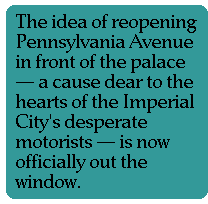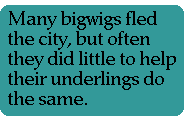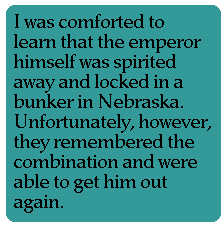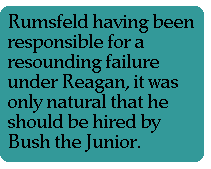Wright
from Washington
City
September 15,
2001
"Security" and dread
Trantor is in shock
By DAVID T. WRIGHT
Friday morning I ran an errand downtown;
that foray together with my experiences Tuesday
are the basis for my initial observations,
which I'll report in the present tense.
While
Washington City is open for business, a few things are
very different from the way they were before September
11. One is the presence of military policemen in battle
dress at every intersection. Some of them are making
themselves useful by directing traffic; others are just
standing around or even sitting in their
camouflage-painted Humvees, the gigantic toadlike things now used
instead of jeeps by the Army and Marines.
Of course, it's not clear just how their presence increases
"security." For one thing, the troops are Dee Cee
National Guardsmen, which means that they are drawn
from Trantor's indigenous  population — a
population not known for the characteristics generally
associated with military effectiveness. These are not
precision-drilled Prussian soldiers. For another, it's not
clear that they have even been trained as military police.
Sure, they wear the MP brassards, but someone might have
just handed the things out and told the puzzled weekend warriors
to try and imitate cops.
population — a
population not known for the characteristics generally
associated with military effectiveness. These are not
precision-drilled Prussian soldiers. For another, it's not
clear that they have even been trained as military police.
Sure, they wear the MP brassards, but someone might have
just handed the things out and told the puzzled weekend warriors
to try and imitate cops.
Real or imitation, what are they supposed to accomplish
at those intersections, anyway? They're not actively
checking anyone out. I guess they could set up
roadblocks in an emergency, but that's the kind of thing
that's generally done after an incident has occurred. In
the case of a suicide attack their presence would
accomplish exactly nothing except, probably, increase
the confusion. (Those Humvees take up a lot of room.)
For now, all the MPs really do is engender an
atmosphere of dread.
Contributing to the oppressiveness is the fact that all
streets for a one-block radius around the Presidential
Palace are cordoned off with yellow police tape.
Checkpoints have been set up in the middle of each
street, through which a person on foot may pass only if
he can show that he works at the palace or one of the
surrounding buildings. I assume the same thing is going
on, though on a larger scale, on Capitol Hill. The idea of
reopening Pennsylvania Avenue in front of the
palace — a cause dear to the hearts of the Imperial City's deperate motorists — is now officially
out the window.
Generally, this being America (sort of) and not Germany,
"security" procedures are pretty half-assed in Our
Nation's Capital. At most public buildings, you could
probably get in carrying a bazooka if you used a little
resourcefulness. Still, the sunny time when our friend
Bureaucrat X could get away (year after year) with
pasting a happy face over the mug shot on his gubmint
ID are over. Mirrors are used to look under cars parking
at ministry buildings, visitors' bags are carefully
scrutinized, and inside the building one's ID must be
worn at all times.
Overhead,  the skies — usually filled with the roar of
jetliners landing and taking off from nearby Reagan
National Airport — are eerily silent, except for the
ominous thumping of important-looking helicopters and
the slow circling of F-15s and F-16s.
the skies — usually filled with the roar of
jetliners landing and taking off from nearby Reagan
National Airport — are eerily silent, except for the
ominous thumping of important-looking helicopters and
the slow circling of F-15s and F-16s.
With aircraft grounded, moving the mail must be
problematic. That undoubtedly explains the unusual
sight of Amtrak trains pulling large numbers of boxcars. I
saw one heading south out of the city with about six
boxcars and another six piggyback cars carrying
semi-trailers.
***
Of course, every flag in town is at half-mast, and every
politician feels the need to bloviate about the "cowardly"
attack, the deep sorrow felt by our masters, their
determination to catch those responsible (that does not
include the American politicians who ordered the
actions that provoked the attack), blah, blah, blah. I was
horrified and disgusted to find a recorded message on
my voice-mail today: the minister of the department, in a
suitably sorrowful yet resolute voice, informing me of
her virtuousness in feeling bad about the killing of all
those poor little people.
Such feelings of benevolence to the great unwashed do
not extend to wishing to share their fate, however. In the
aftermath of the attacks, many bigwigs fled the city, but
often they did little to help their underlings do the same.
In my own department, the same automatic voice-mail
system used to broadcast propaganda was not used on
September 11 to tell people they could leave. In fact, it
took as long as three hours for the news to trickle down to
everyone. Then we were faced with the problem of
getting home. The radio said that the 14th Street Bridge
over the Potomac, the main  artery for traffic from Dee
Cee into Northern Virginia, was closed owing to the
explosion at the Pentagon. That was not true, but it
resulted in an enormous traffic snarl as a huge number
of people simultaneously released from work tried to
find alternate routes home. As we sat motionless in
miles-long traffic jams, we were occasionally passed on
the shoulder by motorcades — sirens blaring, lights
flashing — apparently carrying some medium-high
apparatchik who lacked that ultimate privilege of the
proconsul beset by a barbarian onslaught: the right to
flee by helicopter.
artery for traffic from Dee
Cee into Northern Virginia, was closed owing to the
explosion at the Pentagon. That was not true, but it
resulted in an enormous traffic snarl as a huge number
of people simultaneously released from work tried to
find alternate routes home. As we sat motionless in
miles-long traffic jams, we were occasionally passed on
the shoulder by motorcades — sirens blaring, lights
flashing — apparently carrying some medium-high
apparatchik who lacked that ultimate privilege of the
proconsul beset by a barbarian onslaught: the right to
flee by helicopter.
I was comforted to learn that the emperor himself was
spirited away and locked in a bunker in Nebraska. Unfortunately,
however, they remembered the combination and were
able to get him out again. The reason given for Bush's
excursion was a threat to bring down Air Force One using
one of the hijacked airliners. Whether or not the threat
was actually made, it is laughable to believe that someone flying a
commercial airliner could somehow intercept another plane, much less
engineer a collision with it, without the help
of air-control radar. In any case, we are
assured, Mr. Bush had to be dragged into hiding kicking
and screaming — it was his aides who demanded
that he seek safer ground. I got a nice warm fuzzy when I
learned that.
One senior minister who did not flee, according to the
Ministry of Truth, was the Minister of Peace, Mr. Donald
Rumsfeld. Mr. Rumsfeld was also a figure in the Reagan
regime, where he pushed hard for the building of the
B-1B nuclear bomber. The plane was built, to the tune of
many billions of dollars, but to this day it is not capable of
carrying out its assigned task of infiltration into "enemy"
territory, because its electronics suite does not work as it
is supposed to. It was partly that fact that resulted in the
building of the B-2 bomber, which apparently can fly into
enemy territory, at the cost of even more billions of
dollars. The B-2 became operational just about the same
time the Soviet Union, its supposed raison d'etre,
ceased to exist. I don't know which I like more — a
hugely expensive nuclear bomber that can't perform its
mission, or one that has no mission. Neither plane seems to have played much of a role in
deterring the attacks of September 11. (It is odd that
Minipax's official name is the Department of
Defense. Why in the world did they name
it that, of all things?)
which I like more — a
hugely expensive nuclear bomber that can't perform its
mission, or one that has no mission. Neither plane seems to have played much of a role in
deterring the attacks of September 11. (It is odd that
Minipax's official name is the Department of
Defense. Why in the world did they name
it that, of all things?)
Mr. Rumsfeld having been responsible for such a resounding failure
under Reagan, it was only natural that he
should be hired by Bush the Junior. The years have not
been kind to him: as he stood next to the emperor in a
show of resolution and determination, his face
resembled, appropriately enough, nothing so much as a
death's head. Give him a hood, a scythe, and a dark alley,
and he might scare even Bill Clinton onto the straight
and narrow.
***
By Saturday, much had returned to normal, but a
number of highway exits and on-ramps were still closed,
especially near the Pentagon, and ID checks choked
traffic attempting to get into any of the area's many
military bases. The result, predictably, was more traffic
jams and frustration for anyone attempting to go about
his business. The sacred HOV lane on I-395, the main
artery south of the city, was closed. However, I spotted a
convoy of Army trucks hauling refrigerator containers,
escorted by motorcycle cops, using the lane —
obviously a shipment of corpses from the Pentagon
strike.
Speaking of convoys, I saw three or four made up of
Harley and Harley-clone motorcycles. Many of them
were decked out with American flags. (I also ran across a
couple of Boy Scout troops standing on medians and
waving flags.) Now, I love motorcycles. I own two myself.
But I have to say that I hate bikes with the loud pipes
that Harley riders like to affect these days, and riding
around dressed like an ersatz outlaw biker wrapped in a
flag strikes me as akin to public masturbation.
On the other hand, it's probably one of the more
harmless behavioral pathologies we will be forced to
witness as the American love of jingoism blossoms once
again. God help us. God help us.
© 2001 by WTM Enterprises. All rights
reserved.
What do you think of Wright's analysis? If you'd like to see
your brief comments
posted on the site, please respond here.
All comments will be subject to the usual editing, and we will be
looking for those that are the most thought-provoking, pro or
con.
Return to the David T. Wright
section.
Notice to visitors who came
straight to this document from off site: You are deep in The
Last Ditch. You should check out our home page and table of contents.
 population — a
population not known for the characteristics generally
associated with military effectiveness. These are not
precision-drilled Prussian soldiers. For another, it's not
clear that they have even been trained as military police.
Sure, they wear the MP brassards, but someone might have
just handed the things out and told the puzzled weekend warriors
to try and imitate cops.
population — a
population not known for the characteristics generally
associated with military effectiveness. These are not
precision-drilled Prussian soldiers. For another, it's not
clear that they have even been trained as military police.
Sure, they wear the MP brassards, but someone might have
just handed the things out and told the puzzled weekend warriors
to try and imitate cops. the skies — usually filled with the roar of
jetliners landing and taking off from nearby Reagan
National Airport — are eerily silent, except for the
ominous thumping of important-looking helicopters and
the slow circling of F-15s and F-16s.
the skies — usually filled with the roar of
jetliners landing and taking off from nearby Reagan
National Airport — are eerily silent, except for the
ominous thumping of important-looking helicopters and
the slow circling of F-15s and F-16s. artery for traffic from Dee
Cee into Northern Virginia, was closed owing to the
explosion at the Pentagon. That was not true, but it
resulted in an enormous traffic snarl as a huge number
of people simultaneously released from work tried to
find alternate routes home. As we sat motionless in
miles-long traffic jams, we were occasionally passed on
the shoulder by motorcades — sirens blaring, lights
flashing — apparently carrying some medium-high
apparatchik who lacked that ultimate privilege of the
proconsul beset by a barbarian onslaught: the right to
flee by helicopter.
artery for traffic from Dee
Cee into Northern Virginia, was closed owing to the
explosion at the Pentagon. That was not true, but it
resulted in an enormous traffic snarl as a huge number
of people simultaneously released from work tried to
find alternate routes home. As we sat motionless in
miles-long traffic jams, we were occasionally passed on
the shoulder by motorcades — sirens blaring, lights
flashing — apparently carrying some medium-high
apparatchik who lacked that ultimate privilege of the
proconsul beset by a barbarian onslaught: the right to
flee by helicopter. which I like more — a
hugely expensive nuclear bomber that can't perform its
mission, or one that has no mission. Neither plane seems to have played much of a role in
deterring the attacks of September 11. (It is odd that
Minipax's official name is the Department of
Defense. Why in the world did they name
it that, of all things?)
which I like more — a
hugely expensive nuclear bomber that can't perform its
mission, or one that has no mission. Neither plane seems to have played much of a role in
deterring the attacks of September 11. (It is odd that
Minipax's official name is the Department of
Defense. Why in the world did they name
it that, of all things?)